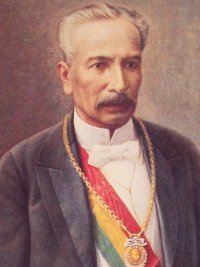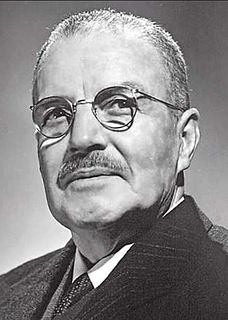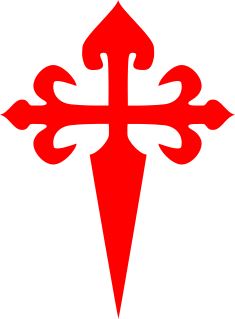 |
|---|
| This article is part of a series on the politics and government of Bolivia |
Presidency |
General elections were held in Bolivia in 1884. [1] Gregorio Pacheco of the Democratic Party received the most votes in the presidential election, whilst the Liberal Party emerged as the largest party in Congress.

Bolivia, officially the Plurinational State of Bolivia is a landlocked country located in western-central South America. The capital is Sucre while the seat of government and financial center is located in La Paz. The largest city and principal industrial center is Santa Cruz de la Sierra, located on the Llanos Orientales a mostly flat region in the east of Bolivia.

Gregorio Pacheco Leyes was the constitutional President of Bolivia from 1884 to 1888. A native of Livilivi, Province of Potosí, Pacheco won a disputed election that was a virtual three-way tie between him, Conservative leader Aniceto Arce, and Liberal chief Eliodoro Camacho. Pacheco was self-made a wealthy man and the country's foremost philanthropist. He made his money purchasing shares in defunct silver mines which he rehabilitated. By the mid 19th century Pacheco emerged as a wealthy, efficient, progressive, and pragmatic silver tycoon. Bolivia's state of instability, fraught with coups and international conflicts concerned him greatly.
The Liberal Party was one of two major political parties in Bolivia in the late 19th century and the first half of the 20th century. The other was the Conservative Party. The Liberal Party was formally founded in 1883 by Eliodoro Camacho. The party espoused freedom of religion, a strict separation between church and state, legal acceptance of civil marriages and divorce, and strict adherence to democratic procedures. When the party took power in 1899, it moved the base of the presidency and the Congress to La Paz, which became the de facto capital city. The Supreme Court remained in Sucre. To this day, Sucre is the de jure capital of Bolivia while La Paz acts as the de facto seat of government.
Contents
As no candidate received an absolute majority in the presidential election, the President was elected by Congress on 1 September. Although Pachecho's Democratic Party was the smallest faction in Congress, he was elected President by 47 votes to 29 for Liberal candidate Eliodoro Camacho after the Conservatives decided to support Pacheco. Their decision followed an agreement between Mariano Baptista of the Conservative Party and Jorge Oblitas and Casimiro Corral of the Liberal Party that Pacheco would work to support Conservative candidate Aniceto Arce in the next elections. [1]
Eliodoro Camacho (1831–1899) was a noted Bolivian politician, party leader, and presidential candidate. The Eliodoro Camacho Province is named after him. Camacho was born in Inquisivi, Department of La Paz, but grew up in Cochabamba. He founded the Liberal Party, which espoused freedom of religion, a stricter separation between church and state, legal acceptance of civil marriages and divorce, and strict adherence to democratic procedures. Camacho also participated as an officer in the 1879-80 War of the Pacific against Chile, and later played a key role in the 1880 Constitutional Convention. Following the establishment of the new post-war order, he led the opposition against the Conservatives. He ran for president in 1884, 1888, and 1892.

Mariano Baptista Caserta was President of Bolivia during the 1892-96 period. A member of the Conservative Party, he was renowned for his stirring oratorical style.

Aniceto Arce Ruiz de Mendoza was President of Bolivia from 1888 until 1892. The Aniceto Arce Province is named after him. Arce was a native of Tarija but was educated as a lawyer and resided most of his life in Sucre, where he became one of the country's foremost silver-mining tycoons. A supporter of Linares and Constitutionalist government, he later served in Congress during the 1870s until the time of the Daza dictatorship. Unlike other capable leaders of his day, Arce did not enlist to serve when the War of the Pacific developed in 1879. Indeed, his became one of the most accommodationist voices in the political spectrum, perhaps as a result of his extensive business connections to Chile, where he sold much of his silver, invested his profits, and sought financing for his projects. His position was that the Litoral was, for various lamentable reasons, largely indefensible. Thus, the country should cut its losses and seek an alliance with Chile rather than with Peru. Despite this minority position, what rang more clearly in the ears of most Bolivians was Arce's steadfast call for the establishment of a conservative democratic order, with the primacy of law, regular elections, and rule by enlightened pro-business elites such as himself. To this end, he founded the Conservative Party, participated as one of the principals in the 1880 Congress that toppled Hilarión Daza, and had a role in the drafting of the country's new Constitution. Moreover, he agreed to become Narciso Campero's vice-president for the crucial, nation-building 1880-84 period.











